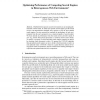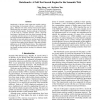499 search results - page 16 / 100 » Search Engines that Learn from Implicit Feedback |
PKDD
2009
Springer
15 years 5 months ago
2009
Springer
Web searches tend to be short and ambiguous. It is therefore not surprising that Web query disambiguation is an actively researched topic. To provide a personalized experience for ...
GROUP
2005
ACM
15 years 4 months ago
2005
ACM
Many virtual communities involve ongoing discussions, with large numbers of users and established, if implicit rules for participation. As new users enter communities like this, b...
ECML
2003
Springer
15 years 4 months ago
2003
Springer
Abstract. Distributed heterogeneous search environments are an emerging phenomenon in Web search, in which topic-specific search engines provide search services, and metasearchers...
103
Voted
SIGIR
2005
ACM
15 years 4 months ago
2005
ACM
We formulate and study search algorithms that consider a user’s prior interactions with a wide variety of content to personalize that user’s current Web search. Rather than re...
114
click to vote
AAAI
2006
15 years 15 days ago
2006
OntoSearch, a full-text search engine that exploits ontological knowledge for document retrieval, is presented in this paper. Different from other ontology based search engines, O...


